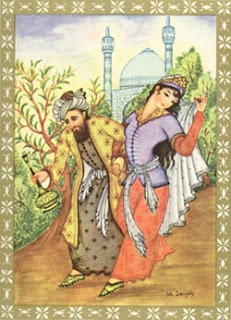今天又是藍天
用心去體念人生中各種各樣的經曆,快樂不用理由,藍天下讓自由的靈魂在飛翔。
再讀古代波斯詩人Omar Khayyam)的詩歌《柔巴依集》(Rubaiyat,郭沫若譯為《魯拜集》。“柔巴依”意為四行詩。詩體形式為一首四行,第一、二、四行押韻,第三行大抵不押韻,類似中國的絕句。《柔巴依集》篇幅短小,一本小冊子。讀一遍花不了多少時間。它變成世界名著,多少歸功於英國作家愛德華·菲茲傑拉德(Edward Fitzgerald)的精彩譯文。
郭沫若的譯本估計依據英文再譯,所以不如就讀英譯本。這裏有一段:
And, as the Cock crew, those who stood before
The Tavern shouted - "Open then the Door!
You know how little time we have to stay,
And once departed, may return no more."
Alike for those who for TO-DAY prepare,
And that after a TO-MORROW stare,
A Muezzin from the Tower of Darkness cries
"Fools! your reward is neither Here nor There!"
Why, all the Saints and Sages who discuss'd
Of the Two Worlds so learnedly, are thrust
Like foolish Prophets forth; their Words to Scorn
Are scatter'd, and their mouths are stopt with Dust.
Oh, come with old Khayyam, and leave the Wise
To talk; one thing is certain, that Life flies;
One thing is certain, and the Rest is Lies;
The Flower that once has blown for ever dies.
Myself when young did eagerly frequent
Doctor and Saint, and heard great Argument
About it and about: but evermore
Came out of the same Door as in I went.
With them the Seed of Wisdom did I sow,
And with my own hand labour'd it to grow:
And this was all the Harvest that I reap'd -
"I came like Water, and like Wind I go."
Into this Universe, and why not knowing,
Nor whence, like Water willy-nilly flowing:
And out of it, as Wind along the Waste,
I know not whither, willy-nilly blowing.
The Moving Finger writes; and, having writ,
Moves on: nor all thy Piety nor Wit
Shall lure it back to cancel half a Line,
Nor all thy Tears wash out a Word of it.
And that inverted Bowl we call The Sky,
Whereunder crawling coop't we live and die,
Lift not thy hands to It for help - for It
Rolls impotently on as Thou or I.




